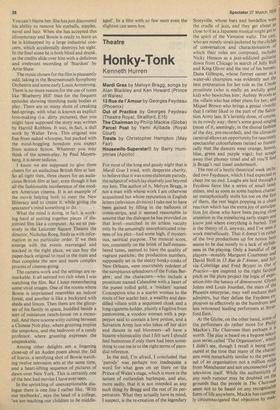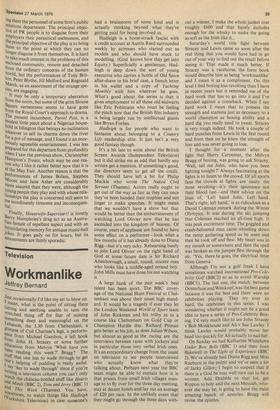Theatre
Honky-Tonk
Kenneth Hurren
Mardi Gras by Melvyn Bragg, songs by Alan Blaikley and Ken Howard (Prince of Wales) 13 Rue de l'Amour by Georges Feydeau (Phoenix) Out of Practice by Georges Feydeau (Theatre Royal, Stratford, E15) The Chairman by Philip Mackie (Globe) Parcel Post by Yemi Ajibade (Royal Court) Treats by Christopher Hampton (May Fair) Housewife-Superstar!! by Barry Humphries (Apollo)
For most of the long and gaudy night that is Mardi Gras I tried, with desperate charity, to believe that it was some elaborate parody, the subject of which lay elusively just beyond my ken. The author of it, Melvyn Bragg, is not a man with whose work I am otherwise acquainted but whose reputation in English letters (television division) I take not to have been gained by filling in the balloons of comic-strips, and it seemed reasonable to assume that the dialogue he has provided on that level—matched in its artless vacuity only by the amusingly unsophisticated triteness of his plot—had some high, if mysterious, satirical purpose. The musical score, too, constantly on the brink of half-remembered tunes, seemed to have the quality of vagrant pastiche; the production numbers, supposedly set in the sleazy honky-tonks of New Orleans, were inscrutably redolent of the sumptuous splendours of the Folies Bergere; and the characters—who include a prostitute named Celandine with a heart of the purest rolled gold, a 'madam' named Concepcion who is a scarlet woman to the roots of her scarlet hair, a wealthy and dandified villain with a sequinned cloak and a long cigarette-holder, plainly a fugitive from pantomime, a voodoo woman with a pepperpot said to contain a love potion, and a Salvation Army lass who takes off her skirt and dances in red bloomers—all have a bizarre whimsicality that I felt sure I should find humorous if only there had been something to cue me in to the right terms of parodial reference.
In the end, I'm afraid, I concluded that 'parody' was perhaps too inadequate a word for what goes on up there on the Prince of Wales's stage, which is more in the nature of outlandish burlesque, and also, more sadly, that it is not intended as any such thing by Bragg and the rest of its perpetrators. What they actually have in mind, I suspect, is the re-creation of the legendary
Storyville, whose bars and bordellos were the cradle of jazz, and they get about as close to it as a Japanese musical might get to the spirit of the Viennese waltz. The cast, who are mostly strait-jacketed by the cliches of conversation and characterisation of which their roles are composed, includes Nicky Henson as a jazz-addicted guitarist down from Chicago in search of Jelly Roll and King Oliver and the rest of his heroes; Dana Gillespie, whose former career as 3 water-ski champion was evidently not the best preparation for her role as the Creole prostitute (who is really an awfully good kid) who bewitches him; Aubrey Woods as the villain who has other plans for her; and Miguel Brown who brings a genial vivacitY that I rather liked to the part of the Salvation Army lass. It's lavishly done, of course, in its rowdy way; there's some good singing (most of it, seemingly, in the dismal fashion of the day, pre-recorded), and the climactic carnival allows an opportunity for raucouslY spectacular colourfulness (seized so french. cally that the dancers wear orange, lemon, blue, green and purple wigs); but scraPe away that phoney tinsel and all you'll find is Bragg's real tinsel underneath.
The rest of a hectic theatrical week included two Feydeaux, which I had expected to cheer me no end. Laughs are laid through a Feydeau farce like a series of small land mines, and as soon as some hapless character metaphorically stubs his toe on the first of them, the rest begin popping in a chain reaction which has the extra joy of anticipation for those who have been paying close attention in the minelaying early stages an.d know just where everything is buried. This is the theory of it, anyway, and I've seen It work marvellously. That it doesn't in either of the two productions up for notice here seems to be due mostly to a lack of stylish' ness in the playing. Only a handful of the players—notably Margaret Courtenay and David Stoll in 13 Rue de l'Amour, and sylvia Coleridge and Fred Bryant in Out Practice—are inspired to the right farcical pitch as the plots project the logic of exPo.' sition into the lunacy of denouement. GlYrIls Johns and Louis Jourdan, the stars of the Phoenix enterprise, may well enchant their admirers, but they defuse the Feydeau plosives as effectively as the humdrum an° less renowned leading performers at Strat' ford East. At the Globe, on the other hand, some °f the performers do rather more for Philip Mackie's The Chairman than perhaps it worth. The play is based on a bygone televe sion series called 'The Organisation', which I didn't see, though I recall it being ruin' oured at the time that many of the characters were remarkably similar to the person' nel of an organisation not a million milC from Manchester and not unconnected wit", television itself. While the authenticity 0' any such rumour may be doubted on the grounds that the people in The Chairman seem not to be based on any recognisable form of life anywhere, Mackie has cunning: ly circumnavigated that objection by Mak ing them the personnel of some firm's public relations department. The principal objective of PR people is to disguise from their employers their parasitical uselessness, and the principal objective of the play is to bring them to the point at which they can no longer disguise it from themselves. It is hard to take much interest in the problems of this enclosed community, remote and detached from the ordinary concerns of the human world, but the performances of Tony Britton, Peter Blythe, Jill Melford and Reginald Marsh, as an assortment of the strange species, are engaging. It may be only a temporary aberration from the norm, but some of the grim Sloane Square earnestness seems to have gone from the Royal Court's approach to drama. The present incumbent, Parcel Post, is a Modest little piece about a Nigerian household in Islington that betrays no inclination Whatever to sell its charms down the river for a pot of message, and I found it an enormously agreeable entertainment. I was less Prepared for this departure from profundity When I saw the previous show, Christopher Hampton's Treats, which may be one reason why I like it rather better now that it is at the May Fair. Another reason is that the Performances of James Bolam, Stephen Moore and Jane Asher are considerably more assured than they were, although the young people they play and with whose relationships the play is concerned still seem to Me inordinately tiresome and inconsequential.
Finally, Housewife-Superstar!! is mostly carry Humphries's drag act as an Austra!tan female of repellent aspect and with an intimidating memory for antique music-hall Jokes. It goes gaily on for hours, but its amusements are thinly sporadic.



































 Previous page
Previous page